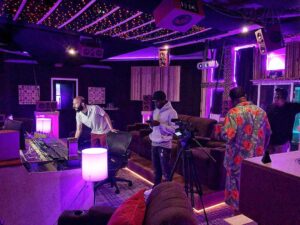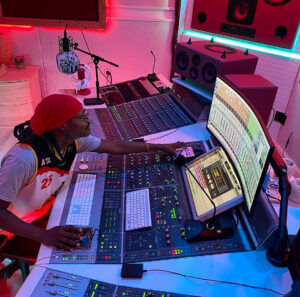One of the most asked questions among artists, musicians, and clients is, “How much time should I record for?” If you have the same question, you are not alone. You have clicked on the very right page.
Doesn’t matter if you are a beginner in the music industry, do podcasts, voice-over for advertisements, or a band prepping for an EP. Analyzing the accurate time you will need to record for your purpose is quite crucial in every field of work.
And an understanding of how many minutes of recording your work requires will ultimately help you plan better. Stay within your budget line, and effectively achieve the best results possible.
Let’s be real, composing and recording a music album for movies, or games takes a lot of time, it can take weeks, or sometimes months. In simple words, if you want to make a track of your own, you need to dedicate a lot of your precious time, and money. And if you know how much recording time you will need, you can save loads of your hard-earned money, and time.
In this blog, we will discuss what exact factors influence your recording time, and how you can estimate the time you will require. Plus, we will also share some really effective tips that will help you make the most of your recording sessions in Atlanta Recording Studio.
Let’s start!
1. Understanding the recording time in a studio setting:

If we talk about a studio setting, the recording time refers to the duration of time you need to record your music, and your work. In simple words, it refers to the number of minutes you are going to book a studio in order to capture your audio content.
This recording time or session includes everything, everything that is required to record the best results. It includes not just the actual recording of your content but also the setup, sound checks, retakes, and even breaks. Don’t worry, we got you, the Best Recording Studios in Atlanta is here to help you out
So, the next time you go to book your recording session in a studio, remember the factors the time includes. It’s one in a million who can record in one take, otherwise, each one of us requires retakes, and some may take multiple retakes as well.
1. pre-production activities:
Pre-production activities, as the name suggests refer to the multiple activities that musicians do before producing their audio. These activities may include- discussing song structure, finalizing the structure of your music, and scripts, and preparing for equipment.
2. tracking:
Capturing what you have actually performed.
3. review sessions:
Review sessions are similar to what we do after completing answers in exams- reviewing for mistakes. Reviewing sessions in recording audio is all about listening back to recordings and deciding if you need retakes or just a few adjustments.
4. technical adjustments:
Recording sessions require technical adjustments like Setting up microphones, configuring software, and sometimes managing acoustics.
( Also Read About – What are the differences between a good recording studio and an average one? )
2. Factors that influence your recording time:
There are many factors that can influence your recording time and may increase your expenses for audio production. Let’s know what exactly these factors are and how you can tackle them.
1. Project type:
The project you are working on plays a huge role in the recording time. Whether you are working on recording a single song, a voice-over for an advertisement, a music album, or a podcast video for your YouTube channel.
Each one of them has different audio requirements and thus the recording time for each may vary.
2. Preparation level:
If your goal is to reduce your recording time, then all you need is practice aka a preparation session. The more you prepare in practice the less time you are likely to take while recording, as this will reduce your chances of taking retakes and adjustments.
It is seen that musicians who spend more time practicing often end up taking less recording time in comparison to unprepared artists.
3. Complexity of recording:
Recording music, and audio is not as easy as it appears to be. Sometimes the complexity of the script, layered vocals, and multiple instruments make the whole recording process longer than usual.
For instance, if you are recording a simple song with not many special sound effects. You will require less time than a fully produced rock anthem with complex instrumentation.
4. Sound quality requirements:
The saying goes- the more your wants are the more you need to spend. Here, spending means your precious time and money. The better sound quality you expect to record, the more recording time you will need for mixing and mastering.
Professional artists and audiophiles often spend extra hours achieving perfection, and high sound quality, perfecting minute details.
5. Studio setup:
As I said before, recording time does not only mean pressing the record button. It includes factors like studio setup. So, the time you take to set up your studio, install instruments, soundcheck, and troubleshoot technical issues can affect your recording time.
6. Experience of the performer:
The more experienced your singer, your performer is, the less he will take retakes, and need adjustments. And thus the recording time he will need will likely be less.
3. Estimating your studio recording time:

Before we discuss how to estimate your studio recording time, you will first need to categorize who you are, and what your project is.
1. For musicians:
A. Single songs: if you are to record a single song, you will typically need 3-4 hours of recording time. This recording time is inclusive of everything- recording, basic mixing, and revisions. However, if you plan on recording a polished, radio-ready track you will need additional time for detailed mixing.
B. EP (4-6 songs): An EP comprises 4-6 songs, so accordingly you will need a dedicated 20-30 hours of recording time depending on the complexity of the song.
C. A full album: 50-100 hours are going nowhere, you will need this much time to record your album. This recording time includes detailed mixing and mastering. However, if you plan on recording a complex album, you might even require even longer recording hours.
2. For podcasts:
The recording time for a podcast video will also depend on the length of your podcast. Let’s for instance say you are shooting a podcast of 1 hour, then you will need a dedicated 2-3 hours of studio time.
And if you are to include interviews, multi-host setups, or sound design, just add some extra time.
3. For voice-over advertisements/ projects:
Voiceovers are quite time-consuming, so if you even plan to voice over a 5-minute clip, you will need a 30 min-1 hour recording time. And yes, it also depends on the number of retakes and adjustments you have gone through. Commercial projects demanding multiple tones or styles might extend the recording session studios .
Conclusion:
Recording music can turn out to be a tough task especially when you are a beginner in this field. And looking for a proper recording studio to compose your music.
Just remember to be organized, have a plan, take your time, and follow the guide mentioned in this blog to reduce your recording time.
In this blog, we discussed what exact factors influence your recording time, and how you can estimate the time you will require. If you are someone who’s facing difficulties in finding the best Atlanta recording studio. Doesn’t matter if you have queries regarding music studio or Atlanta dance studio rental, we are just a call away.

